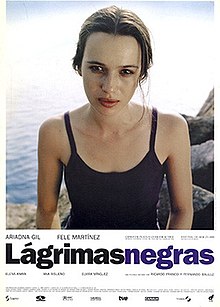Black Tears (1998 film)
| Black Tears | |
|---|---|
 Theatrical release poster | |
| Original title | Lágrimas negras |
| Directed by |
|
| Screenplay by |
|
| Based on | an original story by Ricardo Franco and Dionisio Pérez Galindo |
| Starring | |
| Cinematography | Gonzalo Berridi |
| Edited by |
|
| Music by | Eva Gancedo |
Production companies |
|
Release dates |
|
| Country | Spain |
| Language | Spanish |
| Budget | 300 million ₧ |
Black Tears (Spanish: Lágrimas negras) is a 1998 Spanish romantic drama film directed by Ricardo Franco and Fernando Bauluz. Ricardo Franco's swan song, filming was unfinished upon Franco's death and then completed under assistant director Fernando Bauluz. It stars Ariadna Gil and Fele Martínez alongside Elena Anaya, Ana Risueño and Elvira Mínguez.
Plot
[edit]The plot tracks Andrés, a photographer engaged to his long-time girlfriend Alicia who falls romantically for a mentally-ill woman, Isabel (under the guise of 'Ana'), some time after their first encounter when the assault on Andrés by Isabel together with another woman, Cinta—as well as Andrés' ensuing kidnapping, humiliation and rape—took place.[1][2][3]
Cast
[edit]- Ariadna Gil as Isabel / Ana[4]
- Fele Martínez as Andrés[5]
- Elena Anaya as Alicia[5]
- Ana Risueño as Cinta[5]
- Elvira Mínguez as Marta[5]
Production
[edit]The screenplay was penned by Ricardo Franco and Ángeles González Sinde,[6] based on an original story by Ricardo Franco and Dionisio Pérez Galindo.[7] The plot has a backdrop of autobiographical elements reportedly inspired by Ricardo Franco's relationship with Jean Seberg while the latter was married to Romain Gary.[8][9] Produced by Sogetel and Aurum, the film featured a 300 million ₧ budget.[10] Director Ricardo Franco died in the midst of the shooting and filming was thus completed by assistant director Fernando Bauluz.[10] Shooting wrapped in June 1998 in Portugal.[10][11] Gonzalo Berridi was responsible for cinematography and Eva Gancedo for the music.[2]
Release
[edit]The film screened at the 43rd Valladolid International Film Festival (Seminci) in October 1998.[6] It also screened at the 49th Berlin International Film Festival (Berlinale) in February 1999.[12] It was theatrically released in Spain on 26 February 1999.
Accolades
[edit]| Year | Award | Category | Nominee(s) | Result | Ref. |
|---|---|---|---|---|---|
| 1998 | 43rd Valladolid International Film Festival | Silver Spike for Best Actress | Ariadna Gil | Won | [13] |
| 2000 | 14th Goya Awards | Best Actress | Ariadna Gil | Nominated | [14] |
See also
[edit]References
[edit]- ^ Perriam, Chris (2003). Stars and Masculinities in Spanish Cinema: From Banderas to Bardem. Oxford University Press. pp. 183–184. ISBN 0-19-815996-X.
- ^ a b Morales, Teresa (18 October 2005). "'Lágrimas negras', cuando el cine español todavía era bello, y bueno". Espinof.
- ^ "Lágrimas negras". Fotogramas. 29 May 2008.
- ^ Perriam 2003, pp. 183–184.
- ^ a b c d "Guía Lágrimas negras: directores, Ricardo Franco, Fernando Bauluz. España: Sogetel, Aurum, 1999" (PDF). Institut Valencià de Cultura-Filmoteca. Retrieved 1 June 2022.
- ^ a b Fernández Santos, Ángel (29 October 1998). "Ariadna Gil mantiene viva la pasión que puso Ricardo Franco en "Lágrimas negras"". El País.
- ^ "Lágrimas negras / Black Tears". San Sebastián Film Festival. Retrieved 1 June 2022.
- ^ Boquerini (31 August 2019). "40 años sin Jean Seberg, la actriz maldita". El Correo.
- ^ Díaz de Tuesta, M. José (20 February 1999). "El equipo de "Lágrimas negras" expresa su fidelidad a Ricardo Franco". El País.
- ^ a b c "La huella de un romántico". El País. 28 June 1998.
- ^ García, Javier (28 June 1998). "El actor Fele Martínez afirma que no puede evitar ver "el lado fatal de la vida"". El País.
- ^ Ruiz Mantilla, Jesús (14 February 1999). "Las estrellas de Hollywood se van a cenar". El País.
- ^ Fernández Santos, Ángel (1 November 1998). "Ken Loach gana una merecida Espiga de Oro en el festival de cine de Valladolid". El País.
- ^ "Lágrimas negras". premiosgoya.com. Academia de las Artes y las Ciencias Cinematográficas de España. Retrieved 1 June 2022.
